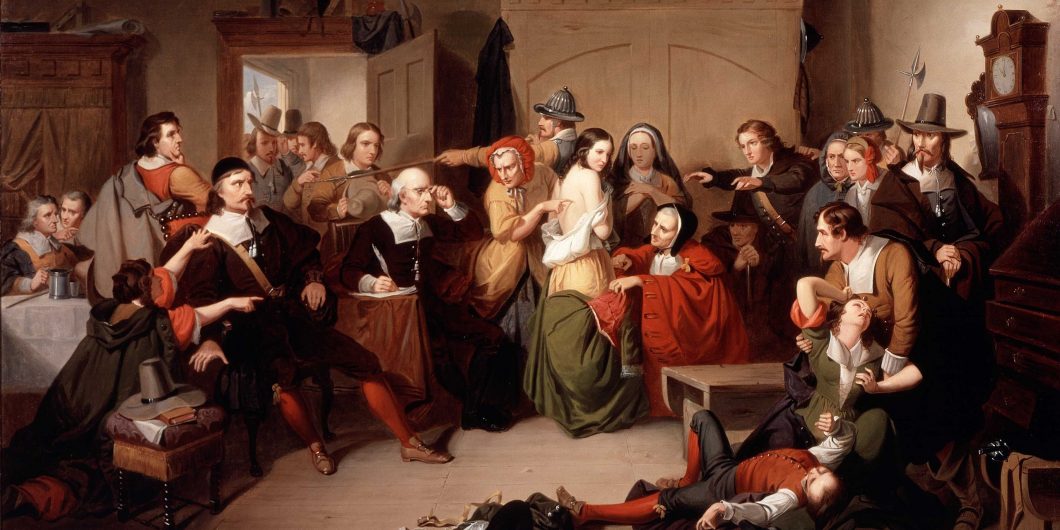From Witchcraft to Wokecraft
Andrew Doyle’s The New Puritans: How the Religion of Social Justice Captured the Western World—which he’s described as his “final word” on contemporary culture wars—draws in part on an argument I’ve made, both in the Spectator and for this magazine. To wit, “those who are too famous, wealthy, or powerful to be cancelled” instead end up in media outlets read or watched by readers or viewers with whom they already agree.
I call the phenomenon “the Silo Effect”, perhaps betraying a country childhood. Doyle, following me, does the same. Only true superstars—think J. K. Rowling—avoid this fate. Cancel mobs cannot hold back the tidal wave of people who want to read everything Rowling puts into print.
Imagine, then, two polished metal grain silos facing each other across an expanse of fields, or on opposite sides of a rural highway. Unless their respective owners make a deliberate decision, there’s no way the contents of either will commingle with the other. When I tell people the first piece I wrote on cancel culture ran in the Guardian—in April 2015—their stunned responses reveal how much the door has closed to “the other side” since 2016, with Leave’s win in the Brexit referendum and Donald Trump’s election victory.
Yes, the Guardian once evinced an admirable editorial desire to expose left-leaning readers to a wide range of perspectives, including those of political opponents. And no, it doesn’t do that anymore. In the Year of our Lord 2022, I’m confident when I say I’ll never write for the Guardian again.
Doyle, like me, was on the receiving end of a failed cancellation attempt. In both cases, bad behaviour from those who hated us parlayed our books into bestsellers. We were, however, siloed. Doyle now works for GB News, a centre-right television station where the owners, Doyle, and viewers all agree on the importance of free speech.
Yet Doyle is a lifelong Labour voter who supported Jeremy Corbyn both as Labour leader in 2015 and then in the 2017 general election. It’s just that (in writer Louise Perry’s lapidary words), he’s now “right-coded.” This depressing phenomenon—a by-product of escalating polarisation and partisanship—means The New Puritans will be ignored by the people who most need to read it.
So, if I can persuade people reading this review to buy it and share it around, maybe I’ll do some good.
Doyle starts with the now-familiar claim that Wokery is a Christian heresy, with its concern for victims and exaggerated stories of oppression. However, he soon deviates from the standard theological template and draws on his expertise in Renaissance and Early Modern literature (he has an Oxford doctorate in the field, and once tutored it at the university’s famously gay college, Wadham). He moves deftly onto an argument running thus: what is variously called “the successor ideology,” “critical social justice,” and “identity politics”—“woke” for short—blends Protestant religious fundamentalism with mass hysteria, as in the Salem Witch Trials.
Religiosity and Christian roots aren’t enough to explain Wokery. Something more is needed. That something more turns out to be a combination of mass hysteria and evidentiary gullibility.
This means he eschews other people’s appellations (including mine, usually “Wokery” or, when I’m especially annoyed with Michel Foucault, Wokismé), opting instead for “the new Puritans.” Of particular importance is his account of how various New England courts were persuaded to accept “spectral evidence” from girls claiming that people in their communities were witches who’d signed the Devil’s book and so joined the Devil’s Party. “Spectral Evidence”—ghostly apparitions of certain named townsfolk, sometimes with familiars (a yellow bird; two grotesqueries; a man in black)—along with assertions the girls had been “bitten and pinched by invisible agents” was accepted as evidence of guilt. 19 innocent people were hanged on the strength of it, while one man, Giles Corey, was pressed to death for refusing to enter a plea.
Of course, to state this is to state the commonplaces of American history. In historian George Lincoln Burr’s memorable phrase, “the Salem witchcraft was the rock on which the [Puritan] theocracy shattered.” However, Doyle’s point is that “spectral evidence,” “lived experience,” and “invisible systems of power and oppression” are siblings under the skin. All are based on perception alone and are phenomena only visible to those who claim (or claimed, in the case of the long-dead Salem girls) to be able to see. All allow people who should be called “plaintiffs” or “complainants” to style themselves “victims,” thereby abrogating the presumption of innocence.
This insight lights up the universe—or at least, the university (of which more later). The non-American reader soon learns that when courts stopped accepting “spectral evidence,” the witch trials came to a natural end, while those awaiting trial were pardoned. The whole business lasted little over a year, and Doyle is at pains to show how American witch trials were self-limiting in a way European ones (where tens of thousands of people were executed) often weren’t. He observes that, “by the standards of seventeenth-century Europeans, they showed remarkably little tendency to hunt witches, yet one lapse, repented of by those who had a part in it, has stigmatised them as uniquely inclined to this practice.”
In other words, religiosity and Christian roots aren’t enough to explain Wokery. Something more is needed. That something more turns out to be a combination of mass hysteria and evidentiary gullibility.
The book’s saddest chapter concerns Doyle’s departure from academia, in large part because he blames universities for the credulity and cruelty now pervasive among woke staff and graduates. He points out that freedom of speech is so mistrusted thanks to the belief—and it is mere belief, there is no evidence for it—that “reality is constructed and conceptualised via systems of language.” The universities doubling up as nonsense factories also explains “the monomania over power structures, which followed on directly from the Foucauldian notion of the interconnectivity of power and knowledge.”
Perhaps because of his leftism, Doyle was drawn into doctoral study on “discourses of gender and sexuality,” something he now deeply regrets. He credits a traditional literary scholar and specialist in John Donne’s poetry, Robin Robbins, for helping him see the extent to which it was utter wibble. “Don’t become an academic,” Robbins warned. “You’ll end up deranged, running around the quad screaming why did I waste my life?”
Doyle recounts how he produced “the vapid wordplay of Foucault’s brood” to academic order:
If you wanted a decent grade, it was prudent to pepper your essays with buzzwords such as ‘phallogocentric’, ‘discursive’ or ‘hegemony’. We were taught a code, an abstruse way of writing seemingly engineered to alienate ordinary readers and enable academic careerists to sound authoritative while saying very little.
All this is depressingly familiar to me; I was once invited down the same path. I avoided it because my character combines disagreeableness with artistic conservatism. I mean, when it came to Foucault, Jacques Derrida, and Judith Butler, I adopted what I came to call “the marijuana measure of intellectual quality” or “The Bong Scale” for short. This referred to the amount of cannabis I smoked first to make their witterings intelligible and later to write about them under exam conditions. Unlike Doyle, I am also properly artistically conservative. I don’t think literary representativeness matters, and I would rather have a canon made up wholly of (excellent) books written by dead white men than one made up out of a team of diversity hires selected purely because they tick one or another box.
The New Puritans—thanks to Doyle’s academic background—is scholarly and rigorous. He knows a great deal more about the theory he’s criticising than most of his opponents. He also wears his considerable erudition lightly, writing in a style at once witty and accessible. However, as is always the case with works of this type, I don’t agree with everything. I consider what I say below to be minor defects in an otherwise excellent book, although I think the second criticism is more serious than the first.
My suspicion is that what some call “politeness” to women and minorities may have been purchased at too high a price.
First, Doyle defends the 80s/90s “political correctness” movement. He thinks it did help women, gays, and blacks. He argues that the use of casual slurs was pervasive and that women were routinely dismissed. Doyle himself was also horribly bullied for being gay at school: he was small and slight, so constantly thrown into patches of nettles by other boys. His situation was probably made worse by his location: Northern Ireland during the Troubles.
I, too, remember the 80s. I’m a bit older than Doyle, and to his childhood in Northern Ireland, I raise my childhood in Joh Bjelke-Petersen’s Queensland. We both know what it’s like to be gay in a religious and authoritarian milieu.
I don’t, however, think the 80s/90s political correctness movements were benign or polite. Not only did I experience a PC-inspired 90s attempted cancellation, but it was already difficult to question the theoretical nonsense in humanities and social science disciplines when I started university in 1990. People were lying to get good marks as a matter of routine, something I admit I did. That period was also when feminism went feral, destroying male freedom of association.
At bottom, I think political correctness promotes a milder version of the same verbal unreality that characterizes Wokery. It suggests that if you call the “Chairman” a “Chairperson” more women will want to be Chairpersons. That little Helen never wanted to be a chairperson because she saw the word “man” and thought “I can’t be that.” This isn’t mere politeness. It’s a belief that words can change reality.
I concede I’m open to persuasion on this point, but for now, my suspicion is that what some call “politeness” to women and minorities may have been purchased at too high a price.
Secondly, Doyle tries to argue that Wokery isn’t left-wing. His main justification is that it pays scant attention to class and poverty, focussing instead on identity politics rooted in physical traits. It’s an argument with strong parallels to conservative attempts to argue fascism is a form of socialism.
We’ve all seen various right-wingers do this. They’ll bang on about how the Nazis called themselves “national socialists” and suggest, because Mussolini governed a corporate state, fascism is a form of socialism. It’s an argument that refuses to reckon with the reality that fascism was imposed in the name of at least some conservative ideas: it’s what happens when conservatism metastasises into something awful. Nazism may have been judged at Nuremberg, but it was conservatism that left the courtroom with its reputation in tatters.
A fortiori, Wokery is what happens when leftism and social democracy metastasise into something similarly awful. The woke have nicked Karl Marx’s class-conflict model and then applied it to race, sex, and sexuality instead of rich and poor. Also stolen from other leftist intellectuals is an obsession with hierarchies of oppression coupled with vague plans for a wonderful, utopian future. Yes, there is contempt for the working-class involved, but often because working-class people won’t curb their tongues when speaking about minorities and women. Marx himself despised the lumpenproletariat, while Marxism in practice has been more murderous than fascism.
In other words, Doyle’s got a bad dose of “I wish my political tradition weren’t crap.” Well, I wish my political tradition weren’t crap, too, but both (at least sometimes) are crap, and here we are. I get why people want to wash the stink of metastasised ideologies off themselves, but it’s dishonest. Like the Waffen-SS troops in the famous Peep Show clip, a willingness to ask if those on one’s own side are “the baddies” can be wonderfully clarifying.
The New Puritans comes closest of any book I’ve read to defining a movement that, epistemically, is a bit like nailing jelly to the wall. Slippery attempts to argue that cancel culture doesn’t exist—or that “woke” is a right-wing boo-word made up as a slur—are deftly corralled and exposed to the sunlight. Doyle says he has no desire to revisit the culture wars in book form again. Well, his work here is done; the rest of us reap the benefits.


